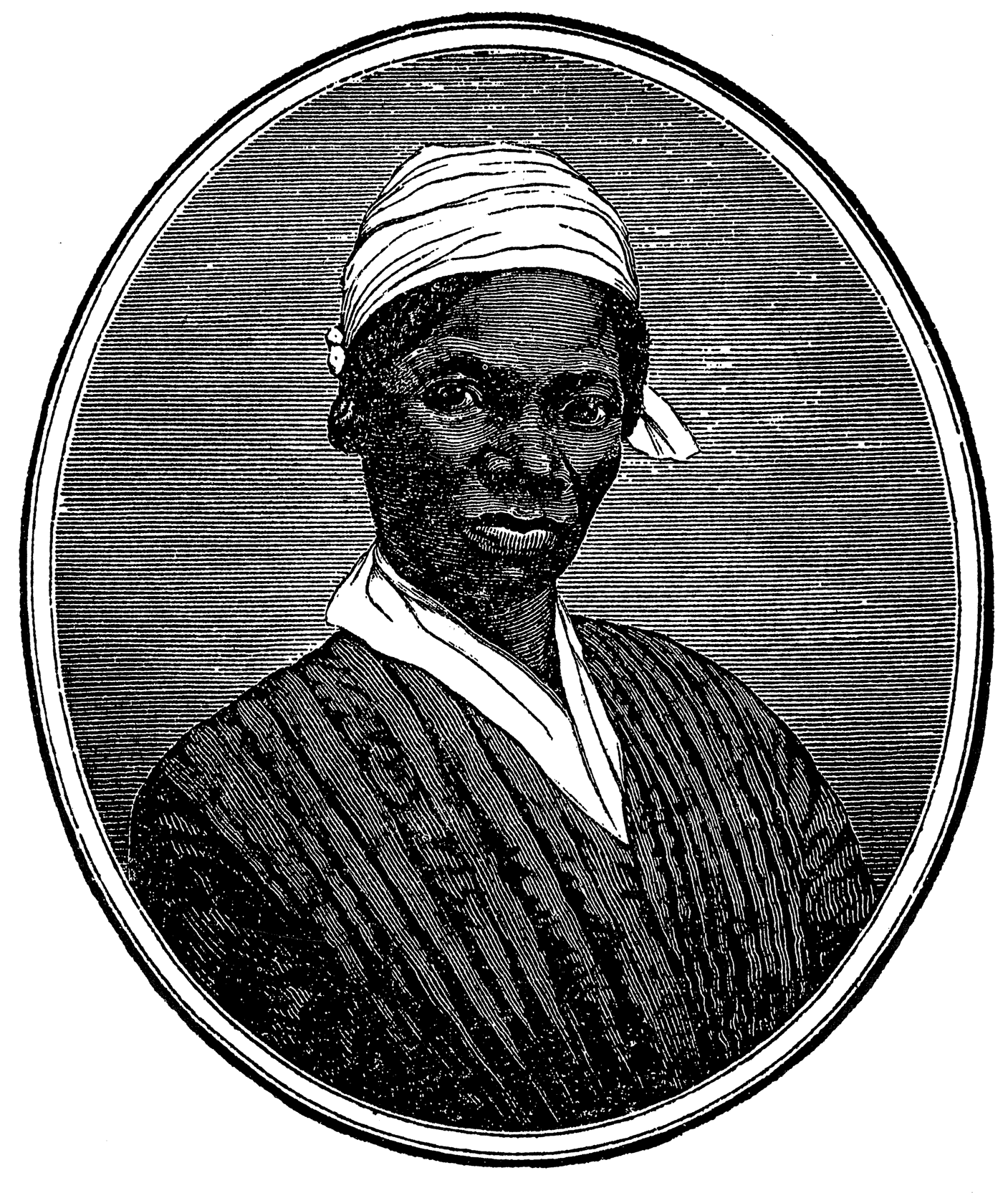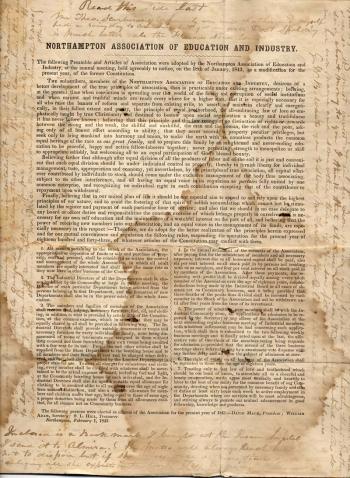A Tradition of Self-Government: Constitution of the NAEI
and Industry 1843 Constitution
1843 CONSTITUTION OF THE NAEI
Click Here to Examine this Document
- What rights does this constitution promise to its members? To what responsibilities do the members commit?
- Who does the agreement include? Men? Women? Whites? Blacks?
- What is the purpose of this constitution? Any constitution?
FOR FURTHER INVESTIGATION
Mayflower Compact
One of the earliest agreements for self-government in America was the 1620 Mayflower Compact, signed by the men who founded the Plymouth colony.
- Who do the passengers of the Mayflower claim gives them the right to make their own “compact”?
- Where do the founders of the NAEI get the right to make this agreement?
- Identify any rights and responsibilities under the Mayflower Compact. How do these compare to those of the NAEI?
“In the name of God, Amen. We, whose names are underwritten, the Loyal Subjects of our dread Sovereign Lord, King James, by the Grace of God, of England, France and Ireland, King, Defender of the Faith, e&. Having undertaken for the Glory of God, and Advancement of the Christian Faith, and the Honour of our King and Country, a voyage to plant the first colony in the northern parts of Virginia; do by these presents, solemnly and mutually in the Presence of God and one of another, covenant and combine ourselves together into a civil Body Politick, for our better Ordering and Preservation, and Furtherance of the Ends aforesaid; And by Virtue hereof to enact, constitute, and frame, such just and equal Laws, Ordinances, Acts, Constitutions and Offices, from time to time, as shall be thought most meet and convenient for the General good of the Colony; unto which we promise all due submission and obedience. In Witness whereof we have hereunto subscribed our names at Cape Cod the eleventh of November, in the Reign of our Sovereign Lord, King James of England, France and Ireland, the eighteenth, and of Scotland the fifty-fourth. Anno Domini, 1620.”
There followed the signatures of 41 of the 102 passengers
Consider also the U.S. Constitution, and the Constitution of the Commonwealth of Massachusetts.
- Where do each of these documents say they get their right to make such an agreement?
- What is the purpose of each of the four documents? How do they differ? How are they the same?
- List and compare the rights and responsibilities under the Massachusetts Constitution, U.S. Constitution, and again, the Compact and NAEI constitution.
- How do the differing purposes of these documents shape how they define the rules?
Rights Under the Massachusetts State Constitution
The Commonwealth of Massachusetts adopted its current constitution during the Revolutionary War in 1780.
All men are born free and equal, and have certain natural, essential, and unalienable rights; among which may be reckoned the right of enjoying and defending their Lives and Liberties; that of acquiring, possessing and protecting personal property, … that of seeking and obtaining their safety and happiness. These rights are natural and not given by a government. Other recognized rights are freedoms of religion, self-government, trial by jury, liberty of the press; and the power to change the government. Taxation must have the consent of the people.
U.S. Constitution and Bill of Rights
The United States adopted the Constitution in 1787 and the Bill of Rights in 1791. The Massachusetts Constitution was one of several state constitutions that influenced the design of the U.S. Constitution.
Preamble:
We the People of the United States, in Order to form a more perfect Union, establish Justice, insure domestic Tranquility, provide for the common defence, promote the general Welfare, and secure the Blessings of Liberty to ourselves and our Posterity, do ordain and establish this Constitution for the United States of America.
Amendment I. (Article I)
Congress shall make no law respecting an establishment of religion, or prohibiting the free exercise thereof; or abridging the freedom of speech, or of the press; or the right of the people peaceably to assemble, and to petition the Government for a redress of grievances.Amendment II. (Article II)
A well regulated Militia, being necessary to the security of a free State, the right of the people to keep and bear Arms, shall not be infringed.Amendment III. (Article III)
No Soldier shall, in time of peace be quartered in any house, without the consent of the Owner, nor in time of war, but in a manner to be prescribed by law.Amendment IV. (Article IV)
The right of the people to be secure in their persons, houses, papers, and effects, against unreasonable searches and seizures, shall not be violated, and no Warrants shall issue, but upon probable cause, supported by Oath or affirmation, and particularly describing the place to be searched, and the persons or things to be seized.Amendment V. (Article V)
No person shall be held to answer for a capital, or otherwise infamous crime, unless on a presentment or indictment of a Grand Jury, except in cases arising in the land or naval forces, or in the Militia, when in actual service in time of War or public danger; nor shall any person be subject for the same offence to be twice put in jeopardy of life or limb; nor shall be compelled in any criminal case to be a witness against himself, nor be deprived of life, liberty, or property, without due process of law; nor shall private property be taken for public use, without just compensation.Amendment VI. (Article VI)
In all criminal prosecutions, the accused shall enjoy the right to a speedy and public trial, by an impartial jury of the State and district wherein the crime shall have been committed, which district shall have been previously ascertained by law, and to be informed of the nature and cause of the accusation; to be confronted with the witnesses against him; to have compulsory process for obtaining witnesses in his favor, and to have the Assistance of Counsel for his defence.Amendment VII. (Article VII)
In Suits at common law, where the value in controversy shall exceed twenty dollars, the right of trial by jury shall be preserved, and no fact tried by a jury, shall be otherwise re-examined in any Court of the United States, than according to the rules of the common law.Amendment VIII. (Article VIII)
Excessive bail shall not be required, nor excessive fines imposed, nor cruel and unusual punishments inflicted.Amendment IX. (Article IX)
The enumeration in the Constitution, of certain rights, shall not be construed to deny or disparage others retained by the people.Amendment X. (Article X)
The powers not delegated to the United States by the Constitution, nor prohibited by it to the States, are reserved to the States respectively, or to the people.
Responsibilities Under the U.S. Constitution
The U.S. Constitution does not list responsibilities in the same way that it does rights. However, it does presume certain civil duties.
Obey the laws of the United States.
Be loyal to the government of the United States.
Serve impartially on a jury if called.
Serve in the armed forces if called.
Vote.
VOCABULARY
- Rights: Things, such as choosing a religion or having an opinion, that every person is allowed to do.
- Responsibilities: Things that you are expected to do.




